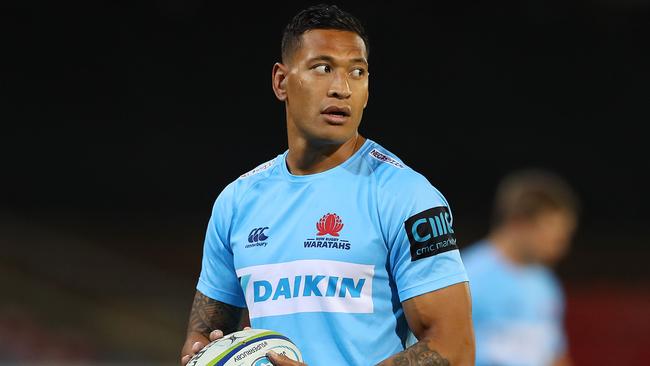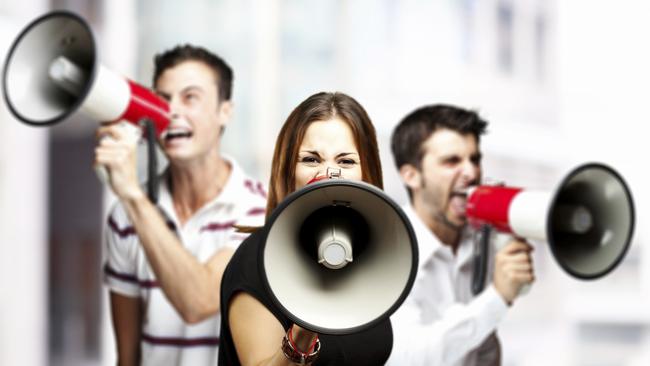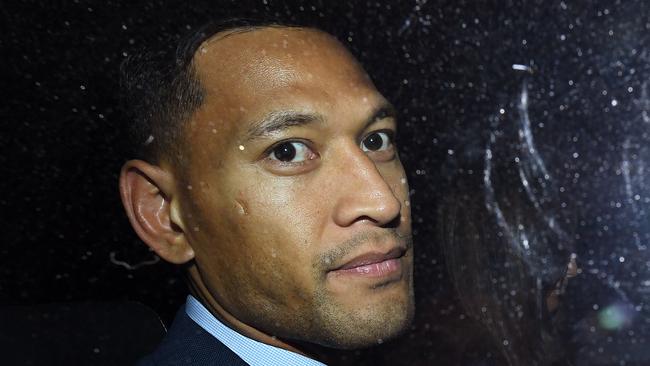Whose freedom of speech is more important?
Since when does a person’s religious beliefs outweigh someone else’s right to seek medical assistance or live their life in peace and safety, let alone privacy and civility here? It seems no one really knows, writes Karen Brooks.
Once again, the notion of “freedom of speech” is a volatile topic.
If it’s not certain politicians or voters demanding their right to say what they want, when they want about whomever, it’s rugby player Israel Folau warning that hell awaits “drunks, homosexuals, adulterers, liars, fornicators, thieves, atheists and idolaters”.
In posting this on Instagram, Folau has been found by an independent panel to be in breach of his professional rugby contract. This point has mostly been lost as his right to “free speech” dominates discussion.
MORE FROM RENDEZVIEW: Stop using ‘freedom of speech’ as an excuse to spout hate
Media commentators such as Alan Jones and even Mark Latham in his maiden speech to the NSW parliament were quick to defend Folau and his rights.
Calling him a “good bloke” and referring to those who found Folau’s comments offensive and potentially contributing to an ongoing discourse of hate and harm as “snowflakes”, “sooks” and “Lefties”, they bleated about religious freedom and censorship, further offending the LGBTQI community in the process.

As an aside, isn’t it amazing that anyone who expresses concern/compassion for others, the environment, or asks for inclusivity and tolerance and calls out hate speech is branded “Left” as a pejorative? As if these are utterly destructive traits that threaten all of society or are exclusive to one side of politics. They’re not.
Yet, this demonstrates just how partisan any defence of perceived threats to the status quo have become. How ideology and calls-to-action have become so polarised and thus politicised.
MORE FROM RENDEZVIEW: Freedom of speech needs to be rebalanced
Now, God-fearing and righteous as Folau might be, that doesn’t make his comments any less harmful, inappropriate or unnecessary — especially when Rugby Australia claims he was previously warned to desist from publicly expressing these views.
Then there was the woman who, at the second leaders’ debate, asked Scott Morrison and Bill Shorten about her religious freedoms and right to speak up against abortion. Is she one of those protesters who waves placards and hurls abuse at the often stressed, sad and conflicted women attending abortion clinics? Clearly feeling her speech was being curtailed, I’m perplexed about exactly what it is she wants to say.

Since when does a person’s religious and/or personal beliefs outweigh someone else’s right to seek medical advice/intervention or live their life in peace and safety, let alone privacy and civility here?
Whose rights are more important?
This isn’t about preventing disagreement, condemnation or criticism — all of which can be healthy for a society. But it is about people — especially powerful people — using those things, often through the lens of religion and/or “free speech”, as an excuse to vilify, threaten and intimidate.
MORE FROM RENDEZVIEW: Free speech isn’t freedom from being called a bigot
As Sami Shah wrote on abc.net.au, “some it would seem, would rather fight for their right to enjoy and express racism (add to this, homophobia, sexism, bigotry, religious zealotry), than someone else’s need to be protected from it”.
Facts are in Australia, we don’t have a legal right to “free speech” — it’s not protected under our constitution.
Rather, we have what’s sometimes described as an “implied” right. But we do have a responsibility for the words we utter, including the potential damage they may cause.
There are repercussions for what we say — as well as when, how and to whom.
This is why there are and has to be limits to the words we choose to utter in public. It works in the interests of democracy.

We especially have a responsibility to protect the targets/victims of this so-called “free” speech by moving against those who abuse it.
How we care for those who don’t have authoritative voices, who lack the words or the platform from which to express themselves, speaks volumes about the kind of culture we are — how tolerant and inclusive.
Shah argues, “free speech is not equally divided among all Australians, and the consequences of transgression are more severe for some than others.” Just ask Yassmin Abdel-Magied, Adam Goodes, Benjamin Law or Yumi Stynes.
As we continue to discuss and debate the boundaries and limitations of what constitutes free speech, it’s fascinating to see who uses the term as a lament or defence and why.
MORE FROM RENDEZVIEW: Free speech? Only if you agree with us
There are those who believe that defending “free speech” gives them, as Chris Allen writing for Medium suggests, “the right to intimidate and harass, to be bigoted and hateful”.
Then, when people criticise them, they pull out the “PC gone mad” line. It’s not PC. It’s called consequences.
The positive and destructive power of words has been proven throughout history. With the megaphone of the internet/media, this has increased exponentially. Never before have responsibility and accountability been more important. And we’re within our rights as a progressive and civil society to expect them.
Dr Karen Brooks is an honorary senior researcher at IASH at the University of Queensland.


